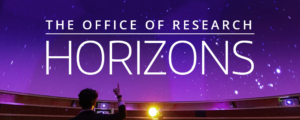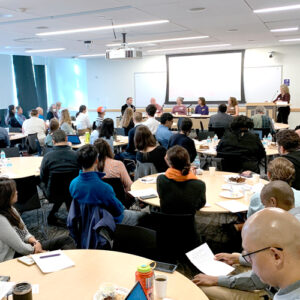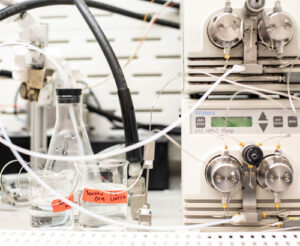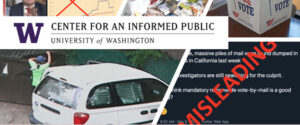Horizons Newsletter – October 2024

A Message from the Vice Provost
Colleagues,
The start of a new academic year brings excitement and a renewed sense of possibilities, especially for those who are beginning the next step in their research career at our institution. I want to extend a special welcome to new faculty and researchers joining the UW this year, several of whom I had the opportunity to meet at the annual NewProfs@UW faculty onboarding event in September. I was impressed as always by the breadth of accomplishments and passion for discovery that they bring to our research community.
This year, NewProfs@UW was a two-day faculty onboarding event, co-hosted with the Libraries, the Office of Academic Personnel, CoMotion, and the Office of Global Affairs. I am grateful to our campus partners and the many faculty and staff who participated in panel discussions, introducing the new faculty to the UW. For those faculty with research interests, we will be offering some follow-on panels over the course of the year. You can subscribe to new2research@uw.edu to get news on these events and other resources.
For all of us at the UW, the excitement of the new academic year is magnified by the news of UW professor David Baker being awarded the Nobel Prize for Chemistry, the eighth UW faculty member to achieve this extraordinary honor! A Professor of Biochemistry and Director of the Institute for Protein Design, David is an esteemed member of the UW research community for his pioneering work and transformative discoveries. His visionary leadership and interdisciplinary approach attracts world-class students, post-docs, and researchers from a variety of fields to UW. Congratulations to David on this remarkable achievement!
While there is much excitement about research, I recognize that there is also much frustration with administrative processes. The university has not yet finished the work needed to realize the benefits of Workday Finance. Unresolved issues continue to cause extra work for faculty and staff (both in the units and centrally), with long delays and sometimes opportunity loss for researchers. I assure you that this is my top priority. To identify and address problems and to improve processes, the Office of Research has been working diligently in partnership with UW-IT and Finance, Planning and Budgeting, as well as with research administration leaders from schools and colleges across campus. I am putting additional resources towards reducing backlogs, and the Provost has committed support for additional permanent and temporary positions in the Office of Sponsored Programs. Since stability will take time, we have a new escalation process for subaward setup, giving more voice to schools and colleges in prioritizing urgent requests. We are starting to see meaningful reductions in the number of long delays, and I’m confident that the positive trends will continue. To move more quickly, our partnership with the units is critical. There are changes in Workday processes that require new steps in the units, and little training has been provided, which leads to mistakes that introduce more delays. As these problems come to light, we are developing better help functions and new resources for training faculty and staff. Thank you to the research administration staff in the units who have been working with us to make this happen.
I’d like to come back to the excitement of our work. As I get to know the breadth of research and scholarship at UW, the more excited I am for others to know about it, both internal to UW and externally. Many of us have heard it said that our great research enterprise is a well-kept secret, but I don’t want that to be the case. Now more than ever, we need to be telling the story of the impressive work that our researchers are doing that has implications locally as well as globally. As one step toward that end, we have created new research web pages that highlight UW research impact and our collaborative culture. Thank you to the University Marketing and Communications team for their partnership with the Office of Research in making this a reality! This is a work in progress. We welcome your suggestions for expanding the scope or ideas for researchers or projects to highlight on our site.
In closing, I want to thank both researchers and support staff for the amazing work they are doing. I look forward to new opportunities to help tell your story.
Mari Ostendorf
Vice Provost for Research
News
Biomedical Research Integrity (BRI) September Wrap-up
 The Biomedical Research Integrity (BRI) program, UW’s “Responsible Conduct of Research” training for current NIH-trainees, moved this year to a new format where trainees can complete all eight hours, in-person, in a single day. Approximately 200 researchers participated in the inaugural run of this format on September 5th, featuring a keynote presentation by research investigator Dr. Ivan Oransky (pictured left) and interactive case examples highlighting core research integrity topics. If you missed our September session, but still need to complete the training, the next opportunity is on March 18, 2025. Register.
The Biomedical Research Integrity (BRI) program, UW’s “Responsible Conduct of Research” training for current NIH-trainees, moved this year to a new format where trainees can complete all eight hours, in-person, in a single day. Approximately 200 researchers participated in the inaugural run of this format on September 5th, featuring a keynote presentation by research investigator Dr. Ivan Oransky (pictured left) and interactive case examples highlighting core research integrity topics. If you missed our September session, but still need to complete the training, the next opportunity is on March 18, 2025. Register.
Ting Cao Appointed Associate Vice Provost for Research Cyberinfrastructure
 Ting Cao, Associate Professor of Materials Science and Engineering, has joined the Office of Research as the new Associate Vice Provost for Research Cyberinfrastructure. In this role, Dr. Cao will oversee the UW’s efforts to expand and enhance its advanced computing and data infrastructure, aiming to empower researchers and students across all disciplines to tackle complex research challenges. The Office of Research welcomes Ting and looks forward to his contributions to our mission.
Ting Cao, Associate Professor of Materials Science and Engineering, has joined the Office of Research as the new Associate Vice Provost for Research Cyberinfrastructure. In this role, Dr. Cao will oversee the UW’s efforts to expand and enhance its advanced computing and data infrastructure, aiming to empower researchers and students across all disciplines to tackle complex research challenges. The Office of Research welcomes Ting and looks forward to his contributions to our mission.
Registration is open for the 2024 3Rs Symposium
 Join Animal Care, Outreach and 3Rs for an engaging session with Dr. Lisa Levin (pictured left), a leading advocate for the 3Rs: replacement, reduction, and refinement. Dr. Levin will discuss key steps in adopting the use of non-animal research models in research. The event will also feature lightning talks by the 2024 3Rs Pilot Award recipients, showcasing their innovative work in advancing the 3Rs principles. A free networking lunch will also be provided for in person attendees. Register.
Join Animal Care, Outreach and 3Rs for an engaging session with Dr. Lisa Levin (pictured left), a leading advocate for the 3Rs: replacement, reduction, and refinement. Dr. Levin will discuss key steps in adopting the use of non-animal research models in research. The event will also feature lightning talks by the 2024 3Rs Pilot Award recipients, showcasing their innovative work in advancing the 3Rs principles. A free networking lunch will also be provided for in person attendees. Register.
NewProfs@UW 2024 Event Welcomes New Faculty
 Over 100 new UW faculty members attended this year’s NewProfs@UW on Sept 12-13, an annual event which connects new-to-UW faculty to resources that support research, scholarship and career development. The Offices of Academic Personnel, Libraries, Research, Global Affairs, and CoMotion partnered this year to facilitate the onboarding event, including office resource overviews and a full day of in-person discussion panels and networking. Visit the OAP website for a full recap of the 2024 event and panelists.
Over 100 new UW faculty members attended this year’s NewProfs@UW on Sept 12-13, an annual event which connects new-to-UW faculty to resources that support research, scholarship and career development. The Offices of Academic Personnel, Libraries, Research, Global Affairs, and CoMotion partnered this year to facilitate the onboarding event, including office resource overviews and a full day of in-person discussion panels and networking. Visit the OAP website for a full recap of the 2024 event and panelists.
eScience Launches the Data Science and AI Accelerator
 The eScience Institute has developed a new incubator program, the Data Science and AI Accelerator, which pairs data scientists with researchers from any field of study to work on focused, collaborative projects. The Accelerator will enable researchers who are new to AI to rapidly develop methods that are meaningful for their application area. Accelerator Projects may be submitted at any time. Projects for Winter 2025 must be received by November 11, 2024.
The eScience Institute has developed a new incubator program, the Data Science and AI Accelerator, which pairs data scientists with researchers from any field of study to work on focused, collaborative projects. The Accelerator will enable researchers who are new to AI to rapidly develop methods that are meaningful for their application area. Accelerator Projects may be submitted at any time. Projects for Winter 2025 must be received by November 11, 2024.
UW Shared Facilities Task Force Convened
 The Vice Provost of Research has convened a 10-member Task Force to identify cross-cutting needs of the UW shared facilities, as well as opportunities for the Office of Research to better support the facilities in enabling high-impact research. The scope is limited to facilities with equipment that requires specialized staff to operate, maintain, and enable research for multiple PIs doing experimental work. Questionnaires will soon be distributed to solicit feedback from management/senior staff and users, but you are also invited to share feedback directly by contacting the co-chairs Maria Huffman and Andrew Oberst.
The Vice Provost of Research has convened a 10-member Task Force to identify cross-cutting needs of the UW shared facilities, as well as opportunities for the Office of Research to better support the facilities in enabling high-impact research. The scope is limited to facilities with equipment that requires specialized staff to operate, maintain, and enable research for multiple PIs doing experimental work. Questionnaires will soon be distributed to solicit feedback from management/senior staff and users, but you are also invited to share feedback directly by contacting the co-chairs Maria Huffman and Andrew Oberst.
At The Center
Showcasing the world-class crossdisciplinary research centers at the UW
Center for an Informed Public

As the Presidential election approaches, we are pleased to highlight the Center for an Informed Public (CIP) and their crucial and timely work confronting the spread of misinformation and strengthening democratic discourse. The nonpartisan CIP is an interdisciplinary collaboration between UW’s Information School (iSchool), School of Law, and the Department of Human Centered Design & Engineering to translate research about misinformation and disinformation into policy, technology design, curriculum development, and public engagement.
One of CIP’s cornerstone programs is media literacy education, including the development of programming such as the annual MisinfoDay in Washington state — educational workshops and activities that equip high school students, teachers, and librarians with tools they need to navigate today’s complex information environments. See the workshop in action in this new video produced by CIP, which also features ways the research center supports intergenerational learning opportunities and uses educational gaming activities developed at the UW iSchool.
For those interested in CIP’s election rumor research, their Rapid Research blog is a regularly updated and timely resource to learn how UW researchers are identifying and debunking election rumors, from allegations of non-citizen voting to newsbrokering on social media platforms.
Learning Opportunities
CORE
Award Administration: Fiscal Compliance – October 29: An intermediate course designed for individuals currently using or administering grant and contract budgets, covering complex policies, rules, regulations, and procedures necessary for post-award administration of grant and contract budgets. Register.
Grants Management for Investigators Live Workshop – October 30: A live, online workshop designed for new principal investigators and non-PIs actively seeking funding, who have yet to attend a Grants Management for Investigators workshop. This training is offered once per year in the fall but can be viewed after as a recorded session. Register.
Subaward Fundamentals – November 6: This training discusses roles, responsibilities, and best practices for monitoring financial and research performance of subawards, also known as subcontracts. Register.
Preparing for an Audit – November 19: This course discusses transactions that are typically identified for review in an audit and how to prepare for an audit. The course will include information on high-risk purchases, principles of allocation of costs, end-of-award purchases, and re-budgeting. Also included in the course will be information provided in the Uniform Guidance and various agency deviations. Register.
SAGE Classes
SAGE Awards & Modifications – October 29: The SAGE Awards course provides an overview of the Award Setup and Modification Request process. Register.
Subawards in SAGE – November 13: This class covers setting up and managing subawards in SAGE. Register.
Biomedical Research Integrity
BRI In-Person Training – March 18, 2025. Federal policy requires that all pre-and post-doctoral researchers supported by NIH training grants receive training in the responsible conduct of research. Typically, researchers need eight hours of instruction every four years. This full day session fulfills the NIH requirements. Register.
Administration
Research Security
UW Research Security Program Update: With funding from the Provost, the Office of Research is developing a new Research Security Program to support compliance with new and enhanced federal regulations. As the first critical step in this process we are pleased to announce we have recruited Jasmine Campbell for the role of Chief Research Security Officer. Jasmine will continue to oversee Export Controls as a component of the larger Research Security Program. In addition, Jasmine will oversee other resources being developed within the Office of Research and in partnership with other central offices to help address research security needs including international travel security, federal reporting and disclosure of foreign support, cybersecurity, and training. More information will be forthcoming as new staff are hired and these initiatives are rolled out.
Research Security By Design Videos: Last month, the Office of Research and OSP launched two new videos related to Federal Research Security by Design: Disclosures and International Collaborations. These videos are designed to help researchers and those who support PIs understand how to integrate research security requirements into day-to-day processes and planning.
OSP: Backlog Reduction
New Staff: The Office of Sponsored Programs is currently hiring 3 positions on our Proposals & Awards Team; two program coordinators and one Grant & Contract Analyst position. We are also hiring a subaward administrator and have extended the temporary position on our Subawards team through March of 2025.
ASRs & MODs Priority Items: OSP publishes its overall week over week volume data for ASRs & MODs. We now also publish the age of items that are work-in-progress. Older items are a top priority. We are beginning to use standardized return reason “prefixes” when items are returned. This will also support accuracy in later reports identifying areas that have high returns.
Recent Guidance Updates:
- NEW Checklist: Award Setup Request – Steps for PI/Campus
- Setup Financials – updated
- Award Changes – updated
- Tell us your story…
- Subawards A-Z Checklist
New Subaward Escalation Process: There is a new subaward escalation process to allocate subaward escalation spots to Schools & Colleges. This list of requests is shared with OSP twice a month for priority assignment. Items must be complete with the ASR/MOD in processed status. Escalated items are assigned to an OSP reviewer ahead of other requests, no matter when they first arrived. The OSP reviewer considers escalated items the highest priority.
SAGE Updates
Over the past several months, ORIS has concentrated on improvements that will reduce the backlogs and returns, and add clarity for campus, releasing:
- SAGE-to-Workday integrations to reduce data entry for GCA when an Advance exists for an award
- Updates to the ASR Budget & Award Lines section to preview what information will be sent to Workday and customize users’ budget view
- Improved hint text throughout SAGE and revised user guides
- Validations to prevent integration errors
- Updates to SAGE Advances to collect additional data needed in Workday and align formats with the ASR and MOD.
Upcoming SAGE updates and reports are planned to assist OSP’s workflow:
- Auto-assignment of eGC1s will be released early November. This frees up some time for OSP managers and team leads who currently assign work manually to refocus on review work. Auto-assignments for Award Setup and Modification Requests is also a planned priority.
- An update to the Subawards request form is planned to include entry for selecting the relevant Grant ID, as well as the ASR/MOD.
- A release of modification subcategory types, scheduled for later this year, will support better assignment, expediting review, preventing returns, and more granular reporting.
- Workload status reports for OSP will help manage workload item status, identify priority items, and re-distribute work as needed.
Financial Conflicts of Interest (FCOI)
Tips for a Significant Financial Interest Review (SFI): For anyone that has an SFI review, please note that the information pertaining to the status of the SFI review for an investigator can only be viewed in the PI, Personnel & Organizations tab of the eGC1. Information in the ASR and MOD records will only show if investigators have met GIM 10 compliance requirements, such as FCOI training and SFI disclosure.
Tips for a smooth review:
- Keep the eGC1s updated with current investigators only
- Ensure that all investigators have disclosed in FIDS initially and at least annually
- Confirm that all investigators are current with their FCOI training (when required).
Please reach out to FCOIRep@uw.edu if you have questions or need assistance.
Finance, Planning & Budgeting (FPB)
New FPB Blog: Finance Planning and Budget has a new blog which contains regular Post Award Grant Administration stabilization updates as well as the latest news and resources on the UW Connect Finance platform, job aids, and training.